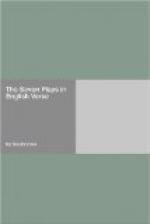Yes, Aias was the man, and I too there
Kept rank, the ‘barbarous mother’s servile son.’
I pity thee the blindness of that word.
Who was thy father’s father? A barbarian,
Pelops, the Phrygian, if you trace him far!
And what was Atreus, thine own father? One
Who served his brother with the abominable
Dire feast of his own flesh. And thou thyself
Cam’st from a Cretan mother, whom her sire
Caught with a man who had no right in her
And gave dumb fishes the polluted prey.
Such was thy race. What is the race thou spurnest?
My father, Telamon, of all the host
Being foremost proved in valour, took as prize
My mother for his mate: a princess she,
Born of Laomedon; Alcmena’s son
Gave her to grace him—a triumphant meed.
Thus royally descended and thus brave,
Shall I renounce the brother of my blood,
Or suffer thee to thrust him in his woes
Far from all burial, shameless that thou art?
Be sure that, if ye cast him forth, ye’ll cast
Three bodies more beside him in one spot;
For nobler should I find it here to die
In open quarrel for my kinsman’s weal,
Than for thy wife—or Menelaues’, was ’t?
Consider then, not my case, but your own.
For if you harm me you will wish some day
To have been a coward rather than dare me.
CH. Hail, Lord Odysseus! thou art come in time
Not to begin, but help to end, a fray.
Enter ODYSSEUS.
OD. What quarrel, sirs? I well perceived
from far
The kings high-voicing o’er the valiant dead.
AG. Yea, Lord Odysseus, for our ears are full
Of this man’s violent heart-offending talk.
OD. What words have passed? I cannot blame
the man
Who meets foul speech with bitterness of tongue.
AG. My speech was bitter, for his deeds were foul.
OD. What deed of his could harm thy sovereign head?
AG. He boldly says this corse shall not be left
Unburied, but he’ll bury it in our spite.
OD. May I then speak true counsel to my friend,
And pull with thee in policy as of yore?
AG. Speak. I were else a madman; for no
friend
Of all the Argeians do I count thy peer.
OD. Then hear me in Heaven’s name!
Be not so hard
Thus without ruth tombless to cast him forth;
Nor be so vanquished by a vehement will,
That to thy hate even Justice’ self must bow.
I, too, had him for my worst enemy,
Since I gained mastery o’er Pelides’ arms.
But though he used me so, I ne’er will grudge
For his proud scorn to yield him thus much honour,
That, save Achilles’ self, I have not seen
So noble an Argive on the fields of Troy.
Then ’twere not just in thee to slight him now;
Nor would thy treatment wound him, but confound
The laws of Heaven. No hatred should have scope
To offend the noble spirits of the dead.




